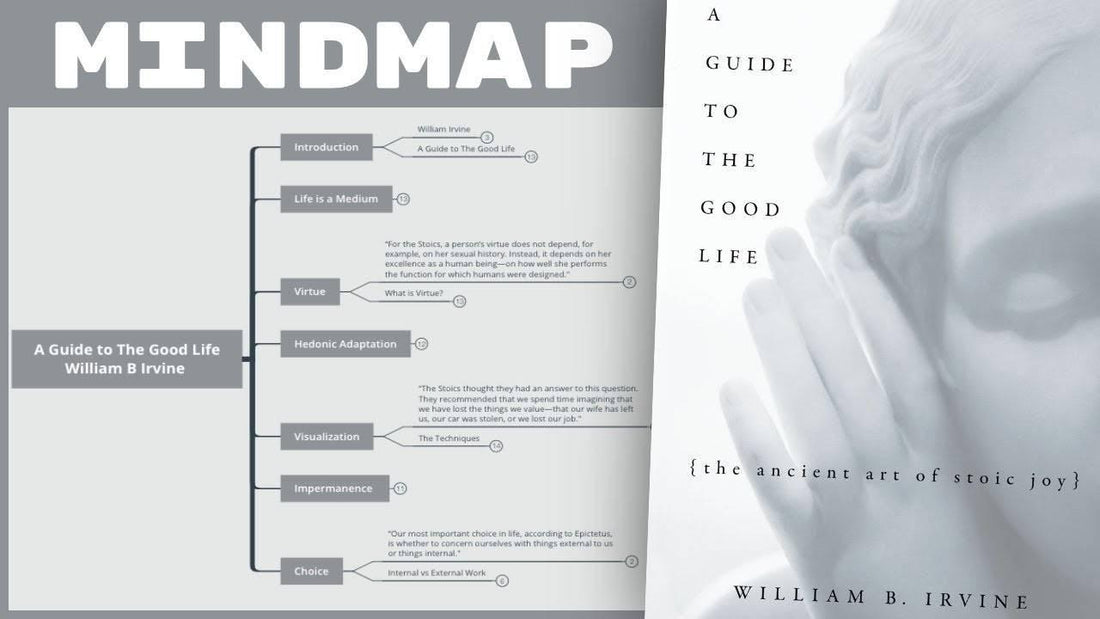vVideo Book Summary
Download all of the Mind Maps here.
Book Summary Notes
A Guide to The Good Life
“This book is written for those seeking a philosophy of life. In the pages that follow, I focus my attention on a philosophy that I have found useful and that I suspect many readers will also find useful."
"It is the philosophy of the ancient Stoics. The Stoic philosophy of life may be old, but it merits the attention of any modern individual who wishes to have a life that is both meaningful and fulfilling—who wishes, that is, to have a good life.”
“I wrote this book with the following question in mind: If the ancient Stoics had taken it upon themselves to write a guidebook for twenty-first-century individuals—a book that would tell us how to have a good life—what might that book have looked like? The pages that follow are my answer to this question.”
Stoicism
Stoicism was originally founded by Zeno.
The primary Stoic philosophers were:
• Marcus Aurelius
• Seneca
• Epictetus
This book will explore all of stoic philosophy and attempt to give us a guide to how these great Stoic Philosophers of old would have encouraged us to live our lives today
• The book is filled with great wisdom and a lot of actionable advice
• Stoic philosophy can help you in life, business and in your mental/spiritual practices
• Pick up the book for a more in depth look!
Life is a Medium
ldquo;According to Epictetus, the primary concern of philosophy should be the art of living: Just as wood is the medium of the carpenter and bronze is the medium of the sculptor, your life is the medium on which you practice the art of living.”
The Art of Living
Stoicism is a very practical philosophy
- Some if not most philosophies or spiritual practices live in the realm of the mind..
- Of course that can be useful for a time.. But really what the Stoics are giving us is a guidebook that we should use in the real world!
Practicing and learning stoicism should lead to real changes in your life
- Are you happier because of it?
- Are you living a life full of love and accomplishment?
- These are the ways to measure your progress..
Practice
- "Your life is the medium on which your PRACTICE the art of living"
- I think that word practice is so important here.. It's not as if when we learn and adopt some stoic philosophy we will ever reach an 'end'
- Instead we'll simply commit to a life of practicing some of the teachings we're learning here in our everyday lives!
Virtue
“For the Stoics, a person’s virtue does not depend, for example, on her sexual history. Instead, it depends on her excellence as a human being—on how well she performs the function for which humans were designed."
"In the same way that a “virtuous” (or excellent) hammer is one that performs well the function for which it was designed—namely, to drive nails—a virtuous individual is one who performs well the function for which humans were designed."
"To be virtuous, then, is to live as we were designed to live; it is to live, as Zeno put it, in accordance with nature. The Stoics would add that if we do this, we will have a good life.”
What is Virtue?
Often we think of virtuous people as having specific characteristics..
- These characteristics often have to do with the belief system we were programmed with since birth..
- See here he says nothing to do with 'sexual history'..
- That is one of the potential belief systems people might be programmed with.. If someone is 'sexually experienced' to put it nicely they aren't virtuous!
- But a really interesting insight here is that it really has nothing to do with these rules or beliefs.. It's about living true to the nature of their being!
A Virtuous person is someone who develops themselves fully..
- What are your strengths? Strive to become stronger there..
- What are your weaknesses? Strive to bring them up..
- It's about self actualization.. Not living based on rules or belief systems..
This is extremely freeing!
- Think about your life..
- Where are you measuring your worth based on rules or belief systems that might not even be yours?
- Where are your measuring others worth based on your belief systems that they may or may not share?
Hedonic Adaptation
“We humans are unhappy in large part because we are insatiable; after working hard to get what we want, we routinely lose interest in the object of our desire."
"Rather than feeling satisfied, we feel a bit bored, and in response to this boredom, we go on to form new, even grander desires. The psychologists Shane Frederick and George Loewenstein have studied this phenomenon and given it a name: hedonic adaptation.
"To illustrate the adaptation process, they point to studies of lottery winners. Winning a lottery typically allows someone to live the life of his dreams. It turns out, though, that after an initial period of exhilaration, lottery winners end up about as happy as they previously were. They start taking their new Ferrari and mansion for granted, the way they previously took their rusted-out pickup and cramped apartment for granted.”
The Next Thing
Human beings are amazing at looking forward..
- We may be the only animal that actually has this ability..
- This is surely a blessing because we can plan for the future!
- But it can also be a curse.. Because we can easily fall into the trap of not being happy now!
Think about all the things you've probably accomplished..
- Maybe you got a new job or started a business! That's awesome.
- How do you feel about it now?
- Check yourself.. Are you adapting towards not feeling like it's enough?
Visualization
“The Stoics thought they had an answer to this question. They recommended that we spend time imagining that we have lost the things we value—that our wife has left us, our car was stolen, or we lost our job."
"Doing this, the Stoics thought, will make us value our wife, our car, and our job more than we otherwise would. This technique—let us refer to it as negative visualization—was employed by the Stoics at least as far back as Chrysippus. It is, I think, the single most valuable technique in the Stoics’ psychological tool kit.”
“The negative visualization technique, by the way, can also be used in reverse: Besides imagining that the bad things that happened to others happen to us, we can imagine that the bad things that happen to us happened instead to others."
"In his Handbook, Epictetus advocates this sort of “projective visualization.” Suppose, he says, that our servant breaks a cup. We are likely to get angry and have our tranquility disrupted by the incident. One way to avert this anger is to think about how we would feel if the incident had happened to someone else instead. If we were at someone’s house and his servant broke a cup, we would be unlikely to get angry; indeed, we might try to calm our host by saying “It’s just a cup; these things happen.” Engaging in projective visualization, Epictetus believes, will make us appreciate the relative insignificance of the bad things that happen to us and will therefore prevent them from disrupting our tranquility.”
“Alternatively, we can do some historical research to see how our ancestors lived. We will quickly discover that we are living in what to them would have been a dream world—that we tend to take for granted things that our ancestors had to live without, including antibiotics, air conditioning, toilet paper (!), cell phones, television, windows, eyeglasses, and fresh fruit in January. Upon coming to this realization, we can breathe a sigh of relief that we aren’t our ancestors, the way our descendants will presumably someday breathe a sigh of relief that they aren’t us!”
The Techniques
Negative Visualization
- Do you want to overcome hedonic adaptation and not take things in your life for granted? Try this.
- Imagine all the most prized things you have in your life..
- Now imagine losing them all.. Seriously!
- Finally come back to reality and feel appreciation for those things..
Projective Visualization
- Do you blow the bad things in your life out of proportion? Try this.
- When something bad happens to you.. Put yourself in another persons shoes!
- How would you want yourself to react?
- Try to act that way instead of blowing the bad thing out of proportion..
Ancestor Visualization
- Are you having trouble seeing how great your life really is? Try this.
- Think about your ancestors and how hard they had it..
- Would you rather be a person in your position now or someone in the roman empire?
Impermanence
"Like Buddhists, Stoics advise us to contemplate the world’s impermanence. “All things human,” Seneca reminds us, “are short-lived and perishable.” Marcus likewise reminds us that the things we treasure are like the leaves on a tree, ready to drop when a breeze blows. He also argues that the “flux and change” of the world around us are not an accident but an essential part of our universe.”
“By contemplating the impermanence of everything in the world, we are forced to recognize that every time we do something could be the last time we do it, and this recognition can invest the things we do with a significance and intensity that would otherwise be absent."
"We will no longer sleepwalk through our life. Some people, I realize, will find it depressing or even morbid to contemplate impermanence. I am nevertheless convinced that the only way we can be truly alive is if we make it our business periodically to entertain such thoughts.”
Meditate on your the beauty of impermanence
The stoics are full of these amazing mediations where instead of seeing everything as blissful and amazing we actually look for the opposite..
- Think about how everything you're doing could easily be the last thing you'll ever do..
- The people you talk to and love will quite quickly become old and die..
For me this seems to be helpful in two ways..
- First is that you can start to appreciate the things in your life for how truly special and meaningful they really are..
- Second is that you can say.. given my limited time here is this really what I want to be doing?
Give this mediation a try!
Choice
“Our most important choice in life, according to Epictetus, is whether to concern ourselves with things external to us or things internal."
"Most people choose the former because they think harms and benefits come from outside themselves."
"According to Epictetus, though, a philosopher— by which he means someone who has an understanding of Stoic philosophy—will do just the opposite. He will look “for all benefit and harm to come from himself.” In particular, he will give up the rewards the external world has to offer in order to gain “tranquility, freedom, and calm.”
Internal vs External Work
Which one of these is truly more important to you?
- Internal work is developing mastery of your own thoughts, beliefs and creating a meaningful life for yourself..
- External work is focusing on the rewards your get like money, cars and influence..
This single choice is going to be the most important choice you make in your life.. You're either choosing self mastery or material mastery.. Likely if you're here you're on the path the the stoics would have wanted for us!

